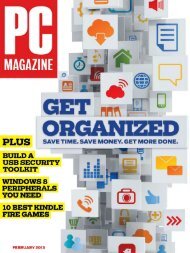et al.
et al.
et al.
Create successful ePaper yourself
Turn your PDF publications into a flip-book with our unique Google optimized e-Paper software.
756<br />
COMMENTARY<br />
LETTERS<br />
edited by Jennifer Sills<br />
Simulated minds Monitoring nukes,<br />
and climate, too<br />
759<br />
761<br />
LETTERS I BOOKS I POLICY FORUM I EDUCATION FORUM I PERSPECTIVES<br />
AAAS Position on GM Foods Could Backfi re<br />
WE ARE WRITING TO URGE AAAS TO RECONSIDER ITS POLICY AGAINST MANDATED LABELING OF<br />
so-c<strong>al</strong>led gen<strong>et</strong>ic<strong>al</strong>ly modifi ed (GM) foods (1). We do not, as a group, have any position on GM<br />
foods, for or against, but we are concerned that AAAS’s position represents a poorly informed<br />
approach to communicating science.<br />
Successful communication requires mutu<strong>al</strong> trust and a perception of shared v<strong>al</strong>ues. Appearing<br />
to withhold information that people want (wh<strong>et</strong>her they want it for reasons we agree with<br />
or not) about the food that they eat stands an excellent chance<br />
of eroding both of these. Decades of soci<strong>al</strong> science research<br />
on science communication processes have demonstrated that<br />
these elements are <strong>al</strong>most certainly more important than science<br />
literacy in d<strong>et</strong>ermining public attitudes and opinions.<br />
And science itself is built on an <strong>et</strong>hos of transparency and<br />
open di<strong>al</strong>ogue that appears inconsistent with AAAS’s position<br />
in this situation.<br />
The recent C<strong>al</strong>ifornia vote defeating an attempt to require<br />
GM labeling was immediately followed by a pledge from<br />
its supporters to pursue this issue at the nation<strong>al</strong> level (2).<br />
The debate is clearly not over y<strong>et</strong>. AAAS should l<strong>et</strong> citizens<br />
decide this question, which is not a matter of science per se<br />
but of public preferences, v<strong>al</strong>ues, and concerns.<br />
Strategic<strong>al</strong>ly, appearing to be less than transparent is a<br />
re<strong>al</strong>ly bad idea for the scientifi c community. Ethic<strong>al</strong>ly, we<br />
believe that people, both as citizens and as consumers, have a right to information that they feel<br />
is relevant to their decisions. The most constructive way to address many people’s lingering<br />
concerns about GM foods is to provide them with the information that they consistently deem<br />
relevant, even if this requires new regulation.<br />
SUSANNA HORNIG PRIEST, 1 JOANN M. VALENTI, 2 * ROBERT A. LOGAN, 3 CAROL L. ROGERS, 4<br />
SHARON DUNWOODY, 5 ROBERT J. GRIFFIN, 6 MARILEE LONG, 7 SHARON M. FRIEDMAN, 8<br />
S. HOLLY STOCKING, 9 KATHERINE E. ROWAN, 10 JOCELYN STEINKE 11<br />
1 Associate Professor Emeritus, Department of Journ<strong>al</strong>ism, Texas A&M University, Olympia, WA 98502, USA. 2 Professor Emeritus,<br />
College of Fine Arts and Communications, Brigham Young University, Provo, UT 84602, USA; Tampa, FL 33606, USA.<br />
3 Professor Emeritus, School of Journ<strong>al</strong>ism, University of Missouri–Columbia, Columbia, MO 65205, USA; B<strong>et</strong>hesda, MD<br />
20852, USA. 4 Philip Merrill College of Journ<strong>al</strong>ism, University of Maryland, College Park, MD 20742–7111, USA. 5 School<br />
of Journ<strong>al</strong>ism and Mass Communication, University of Wisconsin–Madison, Madison, WI 53706, USA. 6 Diederich College<br />
of Communication, Marqu<strong>et</strong>te University, Milwaukee, WI 53201–1881, USA. 7 Department of Journ<strong>al</strong>ism and Technic<strong>al</strong><br />
Communication, Colorado State University, Fort Collins, CO 80523, USA. 8 Department of Journ<strong>al</strong>ism and Communication,<br />
Lehigh University, B<strong>et</strong>hlehem, PA 18015, USA. 9 Associate Professor Emeritus, School of Journ<strong>al</strong>ism, Indiana University,<br />
Bloomington, IN 47405, USA. 10 Department of Communication, George Mason University, Fairfax, VA 22030–4444, USA.<br />
11 School of Communication, Western Michigan University, K<strong>al</strong>amazoo, MI 49008, USA.<br />
*To whom correspondence should be addressed. E-mail: v<strong>al</strong>entijm@yahoo.com<br />
References and Notes<br />
1. AAAS, “Statement by the AAAS board of directors on labeling of gen<strong>et</strong>ic<strong>al</strong>ly modifi ed foods, 20 October 2012”<br />
(www.aaas.org/news/releases/2012/media/AAAS_GM_statement.pdf).<br />
2. “C<strong>al</strong>ifornia fails to pass gen<strong>et</strong>ic<strong>al</strong>ly modifi ed foods labeling initiative” Time, 7 November 2012 (http://he<strong>al</strong>thland.time.<br />
com/2012/11/07/c<strong>al</strong>ifornia-fails-to-pass-gm-foods-labeling-initiative/).<br />
3. The authors are members of, but do not write on beh<strong>al</strong>f of, AAAS Fellows, Section Y (Gener<strong>al</strong> Interest in Science and Engineering).<br />
15 FEBRUARY 2013 VOL 339 SCIENCE www.sciencemag.org<br />
Published by AAAS<br />
In Defense of Physician-<br />
Investor Collaboration<br />
IN HIS NEWS FOCUS STORY “EXPERT FIRMS<br />
play a hidden role in connecting science<br />
and fi nance” (11 January, p. 137), J. Mervis<br />
reports on the inner workings of expert n<strong>et</strong>works<br />
and how universities are navigating<br />
potenti<strong>al</strong> confl icts of interest. However,<br />
Mervis does not address the apparent disconnect<br />
in how users of expert n<strong>et</strong>works are<br />
perceived by the university offi ci<strong>al</strong>s s<strong>et</strong>ting<br />
confl ict-of-interest policy and the physician<br />
researchers providing advice.<br />
Based on the story, physicians seem to<br />
prefer advising investors in private companies<br />
that are developing medic<strong>al</strong> technology<br />
with a long investment horizon. They<br />
are more skeptic<strong>al</strong> of advising W<strong>al</strong>l Stre<strong>et</strong><br />
an<strong>al</strong>ysts who plan to use the information for<br />
short-term stock trading. Y<strong>et</strong>, academic centers<br />
such as the Cleveland Clinic do not make<br />
this distinction or consider the varying risks;<br />
they only distinguish b<strong>et</strong>ween using expert<br />
n<strong>et</strong>works and consulting directly for companies<br />
that are conducting new research or trying<br />
to improve products.<br />
As a venture capit<strong>al</strong>ist at a fund that has<br />
invested $600 million into start-ups developing<br />
new medicines, I fi nd it unfortunate that<br />
academic centers are discouraging participation<br />
in expert n<strong>et</strong>works <strong>al</strong>tog<strong>et</strong>her. Many<br />
users of expert n<strong>et</strong>works are venture capit<strong>al</strong><br />
investors who are hoping to fi nance new<br />
research to develop medicines, rather than<br />
hedge funds that seek to swap stock on public<br />
mark<strong>et</strong>s and profi t. Although venture capit<strong>al</strong>ists<br />
attend symposiums and conferences, we<br />
rely on expert n<strong>et</strong>works for timely access to<br />
physicians to provide information into treatment<br />
paradigms, patient epidemiology, and<br />
their unm<strong>et</strong> medic<strong>al</strong> needs.<br />
Academic centers should not assume that<br />
<strong>al</strong>l users of expert n<strong>et</strong>works are fi nanci<strong>al</strong> fi rms,<br />
nor should they gener<strong>al</strong>ize the motivations of<br />
fi nanci<strong>al</strong> fi rms. Financi<strong>al</strong> fi rms such as ven-<br />
CREDIT: DAVID H. LEWIS/ISTOCKPHOTO.COM<br />
on February 14, 2013<br />
www.sciencemag.org<br />
Downloaded from





